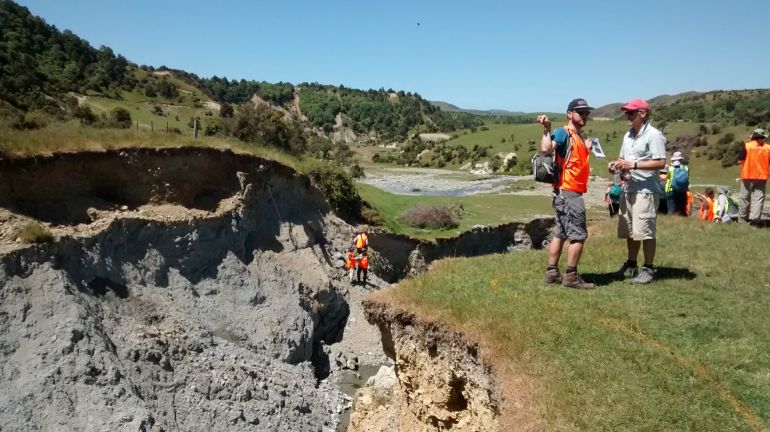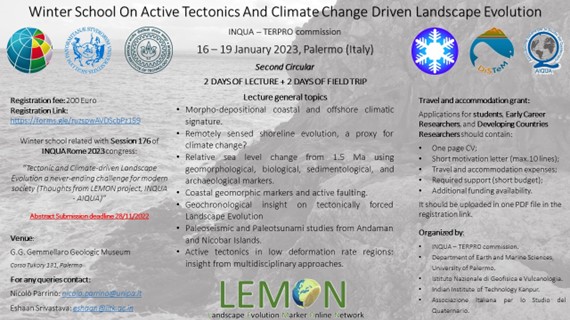TERPRO International Focus Groups & Projects
INQUA IFG 2008F TPPT (Terrestrial Processes Perturbed by Tectonics)

We all live on a planetary surface shaped by terrestrial geoprocesses. This topic has been much in the news lately due to the increase in extreme meteorological events, attributed by some to global climate change. But crustal volcanism and active tectonics also influence terrestrial geoprocesses. These crustal processes make the news only when a large earthquake or eruption occurs, but the events soon drop from the news and people forget about them. However, their secondary effects on terrestrial geoprocesses continue. Our proposed IFG “Terrestrial Processes Perturbed by Tectonics” (TPPT) will support studies of the longer-term effects of tectonic events on geomorphic systems, and contrast them with effects of non-seismic forcing such as extreme meteorological events and slower climate change.
Project 2009P : EDITH – From Earthquake DeformatIon to Seismic Hazard Assessment
Project 2009P details
INQUA IFG 2010F HYPEDAE: PalaeoHYdrological, -PEDological and -AEolian processes shaping Quaternary landscapes
This IFG focuses on continental environments, where the Quaternary evolution has been mainly driven by depositional and erosive phases, varying in time and space, and alternating with less dynamic periods, allowing for soil formation. The associated dynamic processes are recorded in various kinds of geomorphic landforms and deposits, e.g., fluvial, lacustrine, colluvial and eolian sediments, as well as erosional discontinuities. Previous topographic surfaces may get removed, buried or dismantled. On the other hand, the periods of relative geomorphological stability are documented by fossil soils (palaeosols). Their erosion or burial marks the onset of another dynamic phase. The complexity of these geomorphological-sedimentological-palaeopedological archives is further increased, as the associated hydrological, pedological and aeolian processes are not independent from each other: Surface processes related to the hydrological cycle are among the main forces shaping a landscape. The available moisture is also a major factor in the formation of soils and their characteristics, and it is of paramount importance in controlling the production of dust. Dust in the atmosphere in turn plays an important role in climate dynamics.
In the present situation, with rapid climate change, a profound understanding of how surface processes work, how they interact, and how they respond to climatic variations, is of utmost importance. Thus, a comprehension of the earth surface dynamics and its drivers over the Quaternary is a key issue of this IFG. Thereby, our goals are (1) to stimulate progress in each of the involved disciplines, i.e. palaeohydrology, aeolian dust research and palaeopedology, and (2) to bring these disciplines together, e.g. at interdisciplinary conference sessions and workshops to promote the interdisciplinary interpretation of complex continental archives. The IFG has a global perspective but also considers regional and local scales, where representative case studies are carried out and ground truth can be obtained. The time frame of interest encompasses the whole Quaternary up to recent times, with a multidisciplinary approach that includes remote sensing, field work, laboratory analyses, numerical modelling and simulations.
The planned meeting of FLAG in Moscow in September 2020 has been cancelled due to Coronavirus and re-scheduled for September 2021.
INQUA IFG Project 2204: LEMON Landscape Evolution Markers Online Network

Low Strain Rate regions (LSRr), regions deforming at a rate less than 1 mm/yr, are the most widespread areas worldwide. The fact that tectonic deformation occurs not only along the edges, but also inside continental plates is widely accepted nowadays by the scientific community. The tectonic forcing magnitude is stronger enough to trigger significant but infrequent earthquakes in such areas, but not enough to overprint the climatic forcing signature. This peculiar feature makes these regions perfect natural laboratories to analyze how the onshore and offshore landscape evolution (LE) relates to climate and tectonic forcings, both in active and not-active settings.
Several important cities and infrastructures are located in LSRr, and therefore, seismic and climate hazards of these regions are two of the significant challenges that modern societies need to face. Considering this, many authors in the last decades tried to understand how the tectonic and climatic forgings drive the LE and how we could use such information to assess the climatic change and seismic related hazards. These authors focused on how a) climate change influenced erosion and sedimentation rates, b) erosion and sedimentation rates link to the LE in active tectonic areas, and c) erosion and sedimentation products could allow understanding how and how much tectonic and climatic forcing drive LE.
Considering the above, we believe that the analysis of these regions deserves particular attention. Therefore, with this project, we want to pose to the INQUA community following questions:
1. How does landscape evolution relate to tectonics and climate in onshore and offshore LSRr?
2. Which are the most meaningful markers to understand this relationship?
We aim to pursue this research going beyond the physical limit of the coastline through quantitative analyses of erosion and sedimentation rates and forms, which we recognize as triggered by tectonic or climate processes. We want to estimate erosion and sedimentation rates and compare them with fault slip rates and climatic change curves, paleoseismological analyses, faults slip, and tsunami modelling.
We will analyze different LSRr case histories, initially selecting study areas in Italy (Sicily, Po Plain) and India (Gujarat), eventually extending also to other LSRr areas, to try to answer the scientific questions we posed. Outcomes from each analyzed case-history will get organized in the form of datasets and interpretations useful for publishing into high priority peer-reviewed journals. We also target the development of an open-access WebGIS database for storing the most valuable markers, potentially useful for the understanding of the climate and tectonic forcing on the landscape evolution. The data will be acquired in several areas both from the case histories of this project and from the literature. We support the open-data cause and, thus, we will build a community-driven WebGIS in which every researcher can contribute. Doing this, we will facilitate the data exchange between the scientific community of INQUA.
The project will promote most of its ideas and activities by using websites besides the pages of INQUA. Our specific transmission tools are also other leading social networks (e.g., Twitter, Instagram) to be able to engage with the community and disseminate the findings of the working group. We have also scheduled online meetings during which we will monitor the participants in terms of gender, career stage and nationality. We will use all suggestions and guidance available to encourage minorities to participate in all the research activities and to give oral presentations.
Leaders:
- Nicolò Parrino (Palermo, Italy: [email protected])
TERPRO Other Related Projects
Project 2011WG : Peribaltic Working Group
Project 2011WG details
Project 2012WG : Paleopedology
Project 2012WG details

